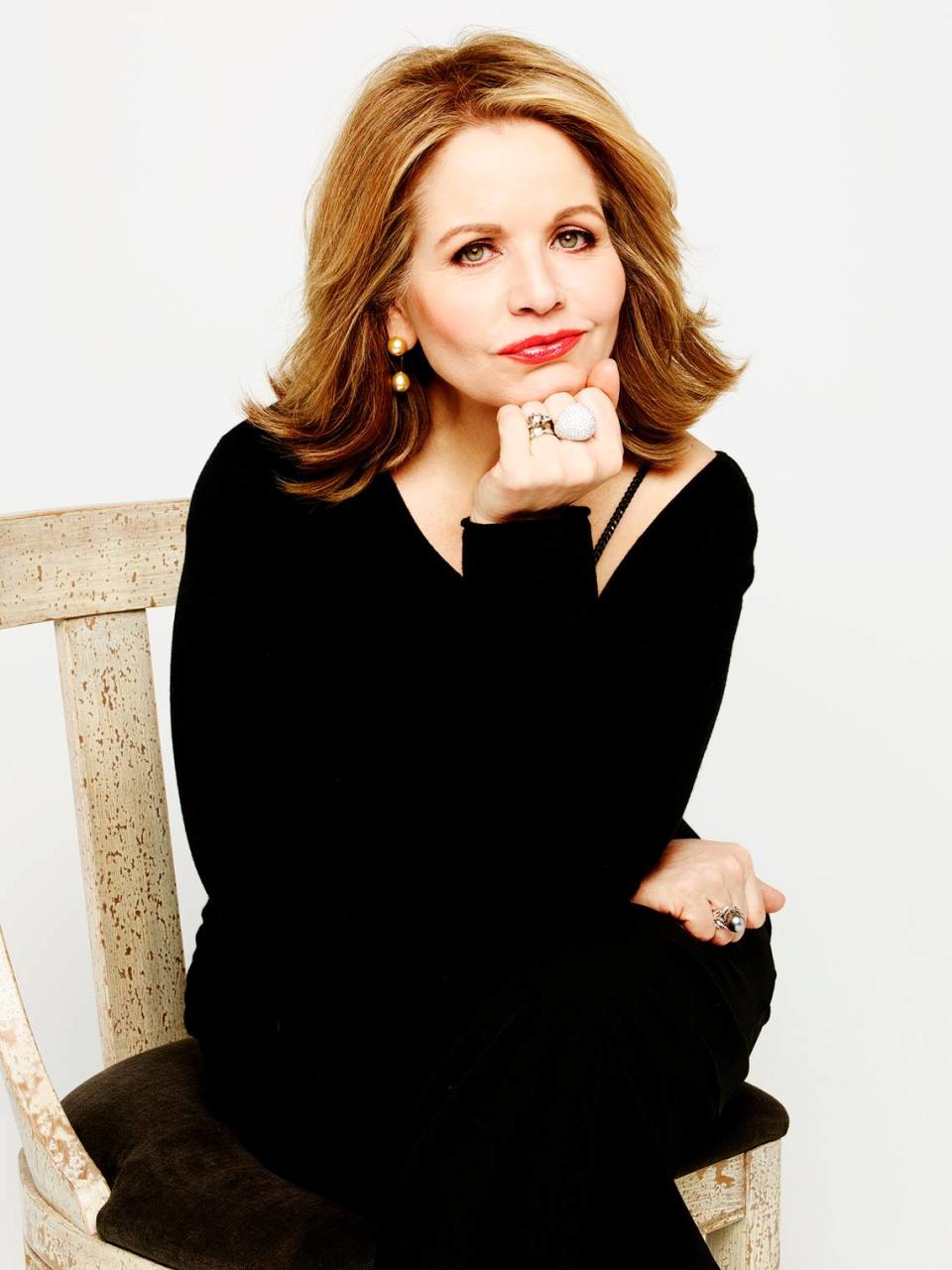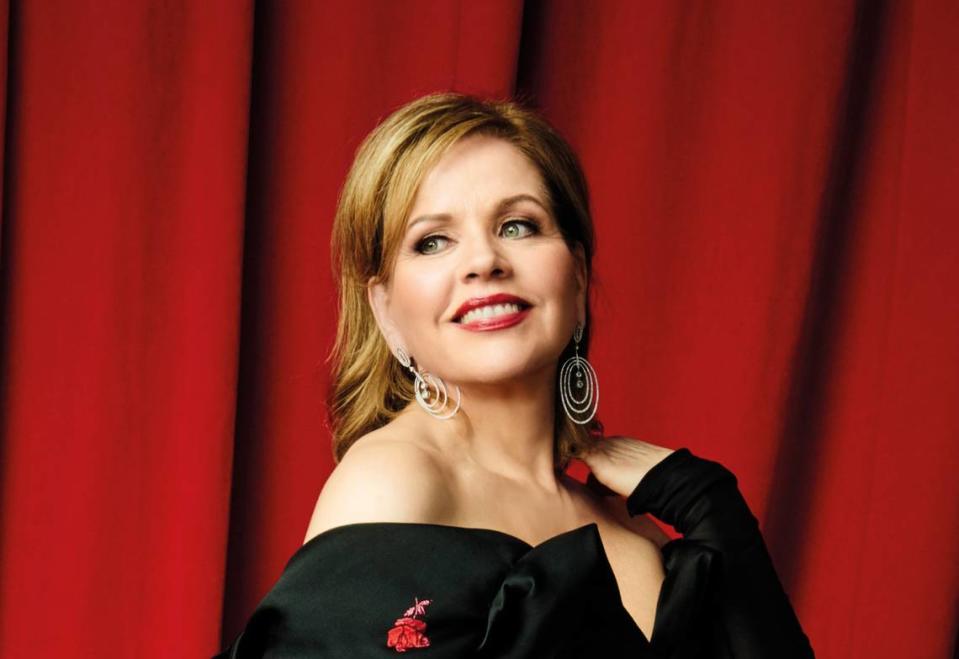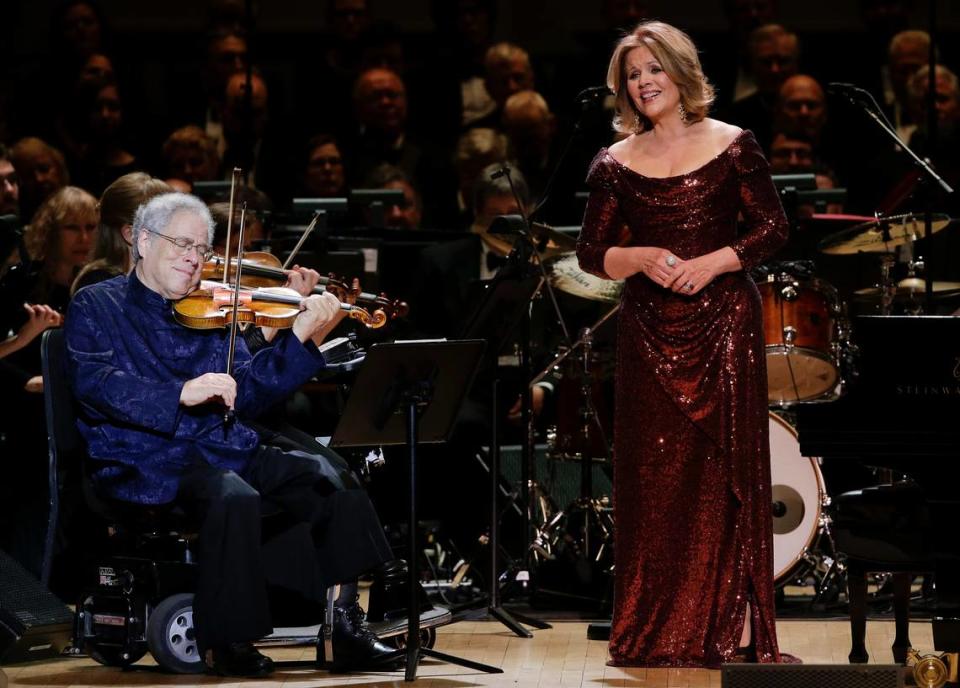Opera star Renée Fleming on performing, music and the mind, and... pickleball?
For one of the world’s best-known opera stars, Renée Fleming has sure popped up in some expected places.
The soaring soprano is the only classical singer to perform the National Anthem at the Super Bowl (in 2014, where Seattle clobbered Denver). She has sung on movie soundtracks from “Piglet’s Big Movie” to “Lord of the Rings: Return of the King.”
And she has been a long-time advocate for the arts and health, particularly in how music can help people heal. That led her to sing in an MRI machine a few years ago, so the National Institutes of Health could study her brain waves.
One place she hasn’t appeared in nearly 20 years is Charlotte. But that’s about to change, as Fleming will perform with the Charlotte Symphony at its annual gala Sept. 20, singing with them for the first time since 2004. The next day, she will moderate a free panel at Queens University of Charlotte on music, neuroscience and health care.

One more thing.
The five-time Grammy winner, who has performed for Queen Elizabeth II, President Barack Obama and at the Nobel Peace Prize ceremonies, is about to receive another accolade this year. The 64-year-old was selected for a Kennedy Center of the Performing Arts’ lifetime artistic achievement award Dec. 3 at a ceremony alongside fellow honorees Billy Crystal, The Bee Gees’ Barry Gibb, Queen Latifah and Dionne Warwick.
Fleming recently spoke with the Observer from her home in northern Virginia about her upcoming appearance with the Charlotte Symphony, her involvement with music and the mind, and an unexpected interest. Answers have been lightly edited for brevity and clarity.
Q & A with opera star Renée Fleming
What can people expect at your concert in Charlotte?
Well, we put together a really exciting program, I think. The (Richard) Strauss “Four Last Songs” is my kind of signature concert work and probably, in my mind, the greatest piece written for soprano and orchestra. It’s epic. It’s absolutely epic. And then in the second half, there’s a little bit of something for everyone. I have Italian arias and Rodgers and Hammerstein. Some of the famous pieces there, and a piece that was written for me. (Andew Lippa’s “The Diva.”) It’s just a few lovely numbers, famous arias and a couple of iconic songs.
Do you have a favorite song of the various pieces you sing, one that you have to have at every concert?
Well, I have to have (Puccini’s aria) “O mio babinno caro.” It’s really kind of epic. It’s universal. It’s universally loved. I also have Leonard Cohen’s “Hallelujah” as an encore, which is another piece that wherever you go in the world, people know it and love it.
I’m curious: Your voice is your life, or certainly a big part of it. What sort of vocal care do you do before and after a concert like this?
it’s just day in and day out, making sure that I maintain vocal health, and that I’m healthy. That’s most of it, that I’m not getting sick. So living moderately, getting enough sleep and staying hydrated. Those are some of the kind of basics.
I understand. I read that you still feel pressure when you go on to stage. I mean, you’ve sung at the Super Bowl, for the queen, let alone all these famous opera houses. Do you still feel that way? And if so, how do you deal with it?
For those types of events? Absolutely. But for coming and singing for friends and family, then it’s all joy. I really love what I do.
I also wanted to talk to you about your longtime advocacy for this study of the relationship between music and health, and music and neuroscience research. I’m wondering how did that start? How does one go from Julliard training and world-class opera to finding an interest becoming an advocate in this world?
It started because I had a lot of stage fright in periods of my development. I also had somatic pain, (a type of aching, gnawing pain), which was kind of a distraction for performance pressure. And so I became interested in the mind-body connection and also interested in the brain. And I discovered that scientists were studying music and the brain, which fascinated me.

And I had moved to D.C. and became an (artistic) adviser to the Kennedy Center, and just coincidentally met (geneticist and NIH director) Dr. Francis Collins at a dinner party in 2015, and started on this journey of really becoming an advocate for the intersection of arts and health. (She also spearheaded a collaboration between the NIH, Kennedy Center and the National Endowment for the Arts called Sound Health that focuses on the intersection of music, health and neuroscience.) And now that I represent the World Health Organization, you know, that’s put a whole new kind of global spin on it. It’s incredibly exciting how fast this sector is exploding.
And you even sang from inside an MRI machine in 2017?
So that was part of an (NIH) experiment and it really worked. It was fascinating to discover that the most impactful activity between speaking, singing and imagining singing was imagining singing. An fMRI measures blood oxygen, and the brain. So they were discovering where the activity was in the brain and how much activity there was.
You also started the Healing Breath Initiative, with Google Arts and Culture, to help people improve their health and well-being through breathing exercises. What are some of the sort of the biggest takeaways you’ve learned over the years from your involvement in these health-related projects?

It’s endless. I have enormous respect for science. And scientists. I think what the NIH does in terms of funding and really validating the best research improves our health every year. When you think of what medicine can do now, it’s just miraculous. Which is why this distrust of science was so shocking to me during the pandemic...
And I’m learning every time I present somewhere because other scientists are always are presenting. And a lot of this is validating things that we intrinsically know about the power of the arts. We know that it’s emotionally impactful and it’s also a powerful source for memory.
And you’ll be leading one of these discussions here in Charlotte. What do you hope that people take away from it?
I hope a lot of people come because it’s enlightening. It’s not difficult. The first time I heard a day of scientists speak, every 10 minutes I thought, I’m not gonna get any of this. But I actually understood basically the concepts of each presentation.
And so the main thing is just remembering that in part of our DNA, and part of what shapes us as human beings, has been the need to create, the desire to be social in an artistic setting and for listening to music together. Our brain waves align. It’s extraordinary.

Finally, you’ve been in the public eye for so long, I’m wondering if there’s anything about you that you do to relax, or hobbies, that would surprise people who know you.
I don’t think there’s too much that would surprise people. You know, I have a very unusual lifestyle. I am traveling almost all the time. But I spent the whole day yesterday in Pittsburgh at a pickleball event because my sister-in-law has become someone who is so good at it that she tours and wins prizes. And so I feel indoctrinated now. I love doing new things like that.
CSO annual gala
What: The Charlotte Symphony Orchestra’s annual gala, featuring opera star Renée Fleming and orchestra conductor laureate Christopher Warren-Green.
When: Sept. 20 at 7 p.m.
Where: Blumenthal Performing Arts’ Belk Theater, 130 N. Tryon St., Charlotte
Tickets: charlottesymphony.org/events
‘Music and the Mind’
What: Renée Fleming leads a free community discussion with local neuroscientists, researchers, physician and educators to discuss their work at the intersection of music, neuroscience, and healthcare. Speakers include Gene Woods, CEO of Advocate Health, the combination of Atrium Health and Advocate Aurora Health.
When: Sept. 21 at 5 p.m.
Where: Sarah Belk Gambrell Center at Queens University of Charlotte, 2319 Wellesley Ave., Charlotte
Tickets: charlottesymphony.org/events
More arts coverage
Want to see more stories like this? Sign up here for our free “Inside Charlotte Arts” newsletter: charlotteobserver.com/newsletters. And you can join our Facebook group, “Inside Charlotte Arts,” by going here: facebook.com/groups/insidecharlottearts.


